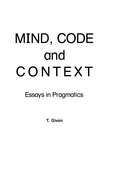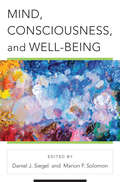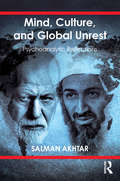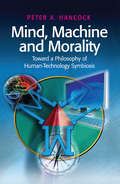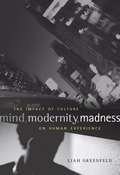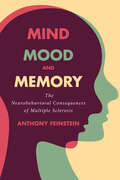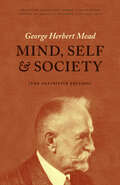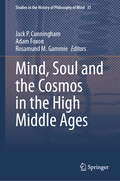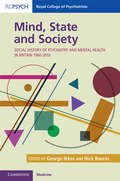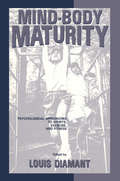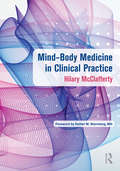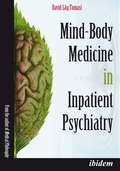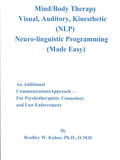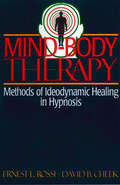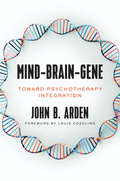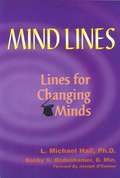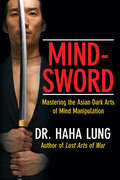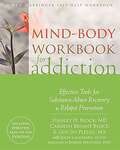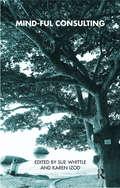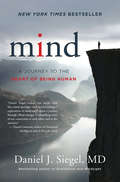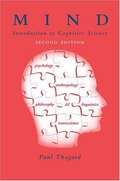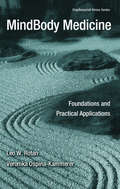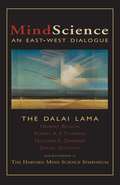- Table View
- List View
Mind, Character and Personality (Christian Home Library #Volume 2)
by Ellen G. WhiteA large portion of this book presents general guiding principles. This is interspersed and supplemented with materials setting forth practical admonitions and counsels in the setting of the relationship of the teacher and the student, the minister and the parishioner, the physician and the patient, or the parent and the child. The counsels in scores of instances addressed to an executive, minister, physician, teacher, editor, husband, homemaker, or youth may, in their revelation or circumstances and advice given, partake somewhat of the form of case histories. Attention should be directed to the principles involved. The book is somewhat encyclopedic. Each quotation carries a specific credit to its source in the Ellen G. White materials, making it possible for the reader in many cases to turn to the full original context.
Mind, Code and Context: Essays in Pragmatics (Neuropsychology and Neurolinguistics Series)
by T. GivonScholars concerned with the phenomenon of mind have searched through history for a principled yet non-reductionist approach to the study of knowledge, communication, and behavior. Pragmatics has been a recurrent theme in Western epistemology, tracing itself back from pre-Socratic dialectics and Aristotle's bio- functionalism, all the way to Wittgenstein's content-dependent semantics. This book's treatment of pragmatics as an analytic method focuses on the central role of context in determining the perception, organization, and communication of experience. As a bioadaptive strategy, pragmatics straddles the middle ground between absolute categories and the non-discrete gradation of experience, reflecting closely the organism's own evolutionary compromises. In parallel, pragmatic reasoning can be shown to play a pivotal role in the process of empirical science, through the selection of relevant facts, the abduction of likely hypotheses, and the construction of non-trivial explanations. In this volume, Professor Givon offers pragmatics as both an analytic method and a strategic intellectual framework. He points out its relevance to our understanding of traditional problems in philosophy, anthropology, linguistics, cognitive psychology, neuro-biology, and evolution. Finally, the application of pragmatics to the study of the mind and behavior constitutes an implicit challenge to the current tenets of artificial intelligence.
Mind, Consciousness, and Well-Being (Norton Series on Interpersonal Neurobiology #0)
by Daniel J. Siegel Marion F. SolomonScientists, clinicians, and mindfulness teachers discuss training the mind to bring more health and resiliency to our lives. In this book, Daniel J. Siegel and Marion F. Solomon have gathered leading writers to discuss such topics as: attention, resilience, and mindfulness; neuroplasticity—how the brain changes its function and structure in response to experience; “loving awareness” as the foundation for mindful living; how mindfulness training can help build empathy and compassion in clinicians; self-compassion; addictions; using breath practice to cultivate well-being; tools for clients who feel disconnected; “therapeutic presence”—how we show up for our clients, how we embody being aware and receptive. The latest entry in the acclaimed Norton Series on Interpersonal Neurobiology, this book brings fresh voices to the all-important topics of meditation, mental training, and consciousness. Mind, Consciousness, and Well-Being offers a unique window into the science and art of taking our understanding of the mind and consciousness and applying it to cultivating well-being in our personal lives and our professional work. Contributors include Pat Ogden, Shauna Shapiro, Bonnie Goldstein, Trudy Goodman Kornfield, Jack Kornfield, Kristin Neff, Judson Brewer, Gary Small, Amishi Jha, and more.
Mind, Culture, and Global Unrest: Psychoanalytic Reflections
by Salman AkhtarIn this compact and pithy book, the distinguished and prolific psychoanalyst Salman Akhtar steps out of his consulting room to address certain matters of urgent global concern. These include migration across national borders, the current refugee crisis, ethno-racial prejudice, subjective distress of minorities, and, above all, the forever-present ominous shadow of terrorism. Akhtar evolves and advocates a uniquely 'anthropological psychoanalysis' which is a blend of depth psychology and humanities, including sociology, economics, political science, history, and , of course, anthropology. He deconstructs what seems self-evident and confronts his readers with some socio-politically unpleasant realities, both within psychoanalysis and in the prevalent perspectives on the on-going turmoil and bloodshed in today's world. His book is not all doom and gloom, however. It also delineates ameliorative strategies for dealing with the pain of the disenfranchised and the misguided violence of the radicalized. This is applied psychoanalysis at its best.
Mind, Machine and Morality: Toward a Philosophy of Human-Technology Symbiosis
by Peter A. HancockTechnology is our conduit of power. In our modern world, technology is the gatekeeper deciding who shall have and who shall have not. Either technology works for you or you work for technology. It shapes the human race just as much as we shape it. But where is this symbiosis going? Who provides the directions, the intentions, the goals of this human-machine partnership? Such decisions do not derive from the creators of technology who are enmeshed in their individual innovations. They neither come from our social leaders who possess only sufficient technical understanding to react to innovations, not to anticipate or direct their progress. Neither is there evidence of some omnipotent 'invisible hand,' the simple fact is that no one is directing this enterprise. In Mind, Machine and Morality, Peter Hancock asks questions about this insensate progress and has the temerity to suggest some cognate answers. He argues for the unbreakable symbiosis of purpose and process, and examines the dangerous possibilities that emerge when science and purpose meet. Historically, this work is a modern-day child of Bacon's hope for the 'Great Instauration.' However, unlike its forebear, the focus here is on human-machine systems. The emphasis centers on the conception that the active, extensive face of modern philosophy is technology. Whatever we are to become is bound up not only in our biology but critically in our technology also. And to achieve rational progress we need to articulate manifest purpose. This book is one step along the purposive road. Drawing together his many seminal writings on human-machine interaction and adapting these works specifically for this collection, Peter Hancock provides real food for thought, delighting readers with his unique philosophical perspective and outstanding insights. This is theoretical work of the highest order and will open minds accordingly.
Mind, Make-Believe and Medicine: Exploring the Divide Between Science and Wishful Thinking
by Richard RaskerThis book delves into the world of alternative medicine and related phenomena in several different ways, both from a scientific perspective and the perspective of supporters and practitioners of those phenomena.An attempt is made to explain not only what those perspectives are, but also why they are often so radically different. Why do lots of people believe things that other people don't? To find answers, we don't just examine the things people believe in or not, but also human traits in thinking, reasoning and belief.
Mind, Modernity, Madness: The Impact of Culture on Human Experience
by Liah GreenfeldIt’s the American dream-unfettered freedom to follow our ambitions, to forge our identities, to become self-made. But what if our culture of limitless self-fulfillment is actually making millions desperately ill? One of our leading interpreters of modernity and nationalism, Liah Greenfeld argues that we have overlooked the connection between egalitarian society and mental illness. Intellectually fearless, encompassing philosophy, psychology, and history, Mind, Modernity, Madness challenges the most cherished assumptions about the blessings of living in a land of the free. Modern nationalism, says Greenfeld, rests on bedrock principles of popular sovereignty, equality, and secularism. Citizens of the twenty-first century enjoy unprecedented freedom to become the authors of their personal destinies. Empowering as this is, it also places them under enormous psychic strain. They must constantly appraise their identities, manage their desires, and calibrate their place within society. For vulnerable individuals, this pressure is too much. Training her analytic eye on extensive case histories in manic depression and schizophrenia, Greenfeld contends that these illnesses are dysfunctions of selfhood caused by society’s overburdening demands for self-realization. In her rigorous diagnosis, madness is a culturally constituted malady. The culminating volume of Greenfeld’s nationalism trilogy, Mind, Modernity, Madness is a tour de force in the classic tradition of Émile Durkheim-and a bold foray into uncharted territory. Often counter-intuitive, always illuminating, Mind, Modernity, Madness presents a many-sided view of humanity, one that enriches our deepest understanding of who we are and what we aspire to be.
Mind, Mood, and Memory: The Neurobehavioral Consequences of Multiple Sclerosis
by Anthony FeinsteinA unique resource for all health care practitioners caring for people with multiple sclerosis.Endorsed by The Consortium of Multiple Sclerosis CentersMultiple sclerosis (MS), a progressive neurologic disease, is characterized by a host of physical symptoms. But the neurobehavioral consequences of MS can be as devastating and debilitating as physical symptoms, and they are often unreported and undertreated. In this new book, Dr. Anthony Feinstein, a neuropsychiatrist, documents the effects of MS on cognition, information processing speed, learning and memory, executive function, personality, mood, and behavior.Feinstein touches on a number of topics, including• the common cognitive challenges that occur with MS, such as slowed information processing speed, impaired memory, and executive function deficits • psychiatric disorders that accompany MS, such as depression and psychosis• current neuropsychological, brain MRI, and treatment data applicable to the psychiatric and cognitive disordersMind, Mood, and Memory in Multiple Sclerosis is enhanced both by the latest science and by eloquent case histories that illustrate each cognitive and emotional disorder. Feinstein also provides recommendations for evidence-based therapeutic interventions. Written in an immediate, accessible way, this book has a crossover appeal, making it of interest not only to neurologists, psychiatrists, neuropsychiatrists, neuropsychologists, psychologists, occupational therapists, and nurses but also to people with MS and their caregivers, family, and friends.
Mind, Self & Society: The Definitive Edition
by Hans Joas George Herbert Mead edited by Charles W. Morris annotated by Daniel R. HuebnerGeorge Herbert Mead is widely recognized as one of the most brilliantly original American pragmatists. Although he had a profound influence on the development of social philosophy, he published no books in his lifetime. This makes the lectures collected in Mind, Self, and Society all the more remarkable, as they offer a rare synthesis of his ideas. This collection gets to the heart of Mead’s meditations on social psychology and social philosophy. Its penetrating, conversational tone transports the reader directly into Mead’s classroom as he teases out the genesis of the self and the nature of the mind. The book captures his wry humor and shrewd reasoning, showing a man comfortable quoting Aristotle alongside Alice in Wonderland. Included in this edition are an insightful foreword from leading Mead scholar Hans Joas, a revealing set of textual notes by Dan Huebner that detail the text’s origins, and a comprehensive bibliography of Mead’s other published writings. While Mead’s lectures inspired hundreds of students, much of his brilliance has been lost to time. This new edition ensures that Mead’s ideas will carry on, inspiring a new generation of thinkers.
Mind, Soul and the Cosmos in the High Middle Ages (Studies in the History of Philosophy of Mind #31)
by Jack P. Cunningham Adam Foxon Rosamund M. GammieThis is a unique volume in which a critical introduction and multiple chapters offer a wide-ranging discussion of medieval conceptions of the nature of humankind, its relationship with the universe, and the processes of thinking by which both are conceptualized. Concentrating on the centuries spanning the High Middle Ages, chapters include in-depth analyses of such ideas as the habit as the ultimate dwelling place of the soul, the Soul of the Universe and its relation to humanity, and the Agent Intellect’s part in the functions of the mind regarding abstraction and intuition. This book explores how metaphysical Intelligences interact with our movements, how the desires of our minds affect the acquisition of knowledge, as well as asking how and why analysis of the makeup of animal souls took place. The High Middle Ages was a crucially important epoch in the history of intellectual endeavor. This volume appeals to students and researchers; it discusses and evaluates the contributions on the subjects of mind, soul, and the cosmos of some of the finest Christian, Jewish, and Moslem intellects in the twelfth and thirteenth centuries. Theologians, philosophers, and cosmologists include Aquinas, Grosseteste, Avicenna, Gersonides, Buridan, the School of Chartres, as well as many others. The overarching theme of this collection of essays is that vitally new conceptions of what it meant to be a rational Human, the purpose of thought in relation to the journey of the soul, and the metaphysical character of our universe contributed enormously to the paradigm-shifting nature of this age.
Mind, State and Society: Social History of Psychiatry and Mental Health in Britain 1960–2010
by Nick Bouras George IkkosMind, State and Society examines the reforms in psychiatry and mental health services in Britain during 1960–2010, when de-institutionalisation and community care coincided with the increasing dominance of ideologies of social liberalism, identity politics and neoliberal economics. Featuring contributions from leading academics, policymakers, mental health clinicians, service users and carers, it offers a rich and integrated picture of mental health, covering experiences from children to older people; employment to homelessness; women to LGBTQ+; refugees to black and minority ethnic groups; and faith communities and the military. It asks important questions such as: what happened to peoples' mental health? What was it like to receive mental health services? And how was it to work in or lead clinical care? Seeking answers to questions within the broader social-political context, this book considers the implications for modern society and future policy. This title is also available as Open Access on Cambridge Core.
Mind-Body Maturity: Psychological Approaches To Sports, Exercise, And Fitness
by Louis DiamantFirst published in 1991. Routledge is an imprint of Taylor & Francis, an informa company.
Mind-Body Medicine in Clinical Practice
by Hilary McClaffertyConsumer demand for integrative medicine has increased over recent decades, and cutting-edge research in neuroscience has identified opportunities for new treatment options. This text outlines the evidence behind mind-body medicine and provides rich case-based examples.. It is written by a clinician, for clinicians, to help practitioners stay current in this emerging field. Including foundational chapters on the relevance of mind-body medicine, the effects of stress, communication skills, and methods for incorporating mind-body medicine into consultation, this book then introduces various mind-body therapies and considers their use in selected clinical conditions. The therapies are grouped into chapters on breath work and relaxation; hypnosis and guided imagery; meditation, mindfulness, spirituality, and compassion-based therapies; creative arts therapies; and movement therapies. Each chapter includes case studies, background and history, best use, training requirements, risks and benefits. The part focusing on specific conditions updates research and provides pediatric and adult examples in the areas of: anxiety and depression; acute and chronic pain; gastrointestinal and urologic conditions; auto-immune, inflammatory; and surgery, oncology, and other conditions. Providing resources and practical tools to help clinicians incorporate evidence-based mind-body medicine therapies into patient care, this book is an invaluable reference for medical and nursing students, as well as for residents, fellows, nurse practitioners and physician assistants across a wide variety of specialties.
Mind-Body Medicine in Inpatient Psychiatry
by David Låg TomasiDavid Tomasi presents new, groundbreaking research on the science and application of Mind-Body Medicine strategies to improve clinical outcomes in inpatient psychiatry settings. Much more than a list of therapeutic recommendations, this book is a thorough description of how Mind-Body Medicine can be successfully applied, from a therapeutic as well as from an organizational, cost-effective analysis viewpoint, to the full spectrum of psychiatric treatments. Furthermore, this study examines the role of multidisciplinary and interdisciplinary treatment teams, with a special focus on the profession and the role of psychotherapists and group therapists, thereby providing solid scientific evidence of the benefits of patient-provider therapeutic alliances. In this sense, this book serves as a guide for professionals and institutions both in the private and the public sphere, to learn effective treatment and management strategies.
Mind-Body Therapy-(NLP)
by Bradley W. Kuhns, Ph.D., O.M.D.A book for additional communication skills for those using interviews, therapy,counseling and investigation. Neuro-linguistic Programming (NLP) connects with different patterns of one's behavior. Dr. Kuhns specialized techniques and approaches will enhance anyone's skills in understanding others.
Mind-Body Therapy: Methods of Ideodynamic Healing in Hypnosis
by David B. Cheek Ernest L. RossiA remarkable collaboration between psychologist Rossi and gynecologist-obstetrician Cheek, this book guides and empowers therapists and patients to find the keys to their own health and well-being through therapeutic hypnosis. Hundreds of engaging case reports from Cheek's forty years of clinical work bring the theory of mind-body therapy to life, while Rossi's chapters link Cheek's often intuitive work to the latest research in psychobiology.
Mind-Brain-Gene: Toward Psychotherapy Integration
by John ArdenAn exploration of the ways the immune system, epigenetics, affect regulation, and attachment intersect in mental health. The evolution of psychotherapy in the 21st Century demands integration. Instead of choosing from the blizzard of modalities and schools of the past, therapists must move toward finding common denominators among them. Similarly, today’s psychotherapy necessitates the integration of the mind and body, not the past practice of compartmentalization of mental health and physical health. This book contributes to the sea change in how we conceptualize mental health problems and their solutions. Mind-Brain-Gene describes the feedback loops between the multiple systems contributing to the emergence of the mind and the experience of the self. It explains how our mental operating networks “self”-organize, drawing from and modifying our memory systems to establish and maintain mental health. Synthesizing research in psychoneuroimmunology and epigenetics with interpersonal neurobiology and research on integrated psychotherapeutic approaches, John Arden explores how insecure attachment, deprivation, child abuse, and trauma contribute to anxiety disorders and depression to produce epigenetic affects. To help people suffering from anxiety and depression, it is necessary to make sense of the multidirectional feedback loops between the stress systems and the dysregulation of the immune system that lead to those conditions. Successful psychotherapy modifies the feedback loops among the self-maintenance systems. Through the orchestration of the mental operating networks, psychotherapy promotes the re-regulation of immune system functions, stress systems, nutrition, microbiome (gut bacteria), sleep, physical inactivity, affect regulation, and cognition. This book makes a strong case for healthcare and psychotherapy to be combined—together they can revolutionize the way we conceive of, and attain, optimal health in the 21st Century.
Mind-Lines: Lines For Changing Minds Fifth Edition
by L. Michael Hall Bobby G. BodenhamerThis book will teach you how to recognize and use the magic of language. Mind-Lines reworks Sleight-of-Mouth patterns using the logical level system of Meta-States. In doing so the authors bring order, understanding, and magic to the use of language in influencing, persuading, selling, negotiating, and many other human interactions.
Mind-Sword: Mastering the Asian Dark Arts of Mind Manipulation
by Lung Dr HahaHere--at last!--is your only chance to fully master the lethal tactics and techniques of the mysterious Asian "shadow cadre. "Miyamoto Musashi (1594–1645)--the greatest swordsman Japan has ever seen and author of the masterpiece Gorin No Sho (A Book of Five Rings)--spent many arduous years as a wandering ronin, studying the murder, mayhem, and mind-control secrets of Asia's dark shadow cadre. Few today are able to grasp the penetrating wisdom of this revered innovator. Now Dr. Haha Lung at last brings his unique perspective to Musashi's hard-won knowledge in this powerful volume, where you'll learn the forbidden secrets of: Japan's Shinobi-NinjaThe (in)famous Hirracarrah spies of ancient IndiaChinese "ninja" such as the Lin-Kuei ("Ghost Warriors") and the Moshuh Nanren espionage and assassination expertsVietnamese "Black Crow" mind-mastersTibetan sDop-sDop mind-warriorsSTREET AND BOARDROOM WARRIORS BE ADVISED: Mind-Sword is for academic study ONLY. Dr. Haha Lung is the author of more than a dozen books on martial arts, including Mind Penetration, Mind Fist, The Nine Halls of Death, Assassin!, Mind Control: The Ancient Art of Psychological Warfare, and Mental Dominance.
Mind-body Workbook For Addiction: Effective Tools For Substance-abuse Recovery And Relapse Prevention
by Stanley H. Block Carolyn Bryant Block Guy Du PlessisCertified as an evidence-based intervention by The Substance Abuse and Mental Health Services Administration (SAMSHA), and listed on the National Registry of Evidence-based Programs (NREPP). Seeking treatment for substance abuse or addiction is half the battle—staying sober is the other. In this important book, physician Stanley Block and addiction specialist Guy du Plessis present a powerful, easy-to-use program for overcoming addiction utilizing the mind-body bridging modality. If you're recovering from substance abuse, you know that every day is a new battle. In fact, staying sober is one of the hardest aspects of addiction recovery, and many people end up relapsing. If you’ve tried traditional treatment but are still struggling to stay on the path to sobriety, you may be ready for a new approach. In Mind-Body Workbook for Addiction, Stanley Block, MD, Carolyn Bryant Block, and founder of the popular Integrated Recovery Program (IRP), Guy du Plessis present an innovative and clinically proven mind-body bridging technique to help you stay sober, manage emotions and stress, and ultimately build a better life. Inside, you’ll find easy-to-use self-help exercises to help you uncover addiction triggers, stay grounded, and prevent future relapse so you can finally heal. Mind-body bridging is a proven-effective method of self-help that teaches you how to regulate strong emotions such as anxiety, anger, worry, and stress—all emotions that lie at the core of addiction issues. You'll learn how to become aware of your negative thoughts, experience them without pushing them away, and then use your physical senses to become more grounded and relaxed, rather than turning to alcohol or drugs for relief. If you're ready to finally gain control of your addiction and stay sober, this book has the potential to change your life.
Mind-ful Consulting
by Karen Izod Sue WhittleThe publication of this book coincides with a increasing recognition that the challenges facing society and organisations are not amenable to "quick fixes". The approaches to consultancy which underpin the cases presented here are particularly relevant in this new context. The contributors are graduates of AOC The Tavistock Institute Masters Programme in Advanced Organisational Change and Consulting and their associates; and the work they describe here is a testament to the quality of that programme and the learning that participants get from it.
Mind: A Journey to the Heart of Being Human
by Daniel J. SiegelA scientist's exploration into the mysteries of the human mind. What is the mind? What is the experience of the self truly made of? How does the mind differ from the brain? Though the mind's contents--its emotions, thoughts, and memories--are often described, the essence of mind is rarely, if ever, defined. In this book, noted neuropsychiatrist and New York Times best-selling author Daniel J. Siegel, MD, uses his characteristic sensitivity and interdisciplinary background to offer a definition of the mind that illuminates the how, what, when, where, and even why of who we are, of what the mind is, and what the mind's self has the potential to become. MIND takes the reader on a deep personal and scientific journey into consciousness, subjective experience, and information processing, uncovering the mind's self-organizational properties that emerge from both the body and the relationships we have with one another, and with the world around us. While making a wide range of sciences accessible and exciting--from neurobiology to quantum physics, anthropology to psychology--this book offers an experience that addresses some of our most pressing personal and global questions about identity, connection, and the cultivation of well-being in our lives.
Mind: Introduction to Cognitive Science (2nd edition)
by Paul ThagardCognitive science approaches the study of mind and intelligence from an interdisciplinary perspective, working at the intersection of philosophy, psychology, artificial intelligence, neuroscience, linguistics, and anthropology. With Mind, Paul Thagard offers an introduction to this interdisciplinary field for readers who come to the subject with very different backgrounds. It is suitable for classroom use by students with interests ranging from computer science and engineering to psychology and philosophy. Thagard's systematic descriptions and evaluations of the main theories of mental representation advanced by cognitive scientists allow students to see that there are many complementary approaches to the investigation of mind. The fundamental theoretical perspectives he describes include logic, rules, concepts, analogies, images, and connections (artificial neural networks). The discussion of these theories provides an integrated view of the different achievements of the various fields of cognitive science. This second edition includes substantial revision and new material. Part I, which presents the different theoretical approaches, has been updated in light of recent work the field. Part II, which treats extensions to cognitive science, has been thoroughly revised, with new chapters added on brains, emotions, and consciousness. Other additions include a list of relevant Web sites at the end of each chapter and a glossary at the end of the book. As in the first edition, each chapter concludes with a summary and suggestions for further reading.
MindBody Medicine: Foundations and Practical Applications (Psychosocial Stress Series)
by Leo W. Rotan Veronika Ospina-KammererMindBody Medicine encapsulates a variety of interventions designed to change, strengthen, or enhance a patient’s thoughts, emotions, and behaviors in order to promote improved health and wellness. There has been a growing trend among professionals in the health care fields to better understand the mind-body connection. How do the body and mind interact and, more specifically, how can we use the energy of the mind to heal the body? Leo Rotan and Veronika Ospina-Kammerer have sifted through already existing works on this topic and compiled a comprehensive overview of this expanding field of study. As a result, MindBody Medicine provides students and practitioners in a range of health care professions with a guide to more fully understand the relationship between body and mind.
MindScience
by Daniel Goleman Herbert Benson Robert Thurman His Holiness the Dalai Lama Howard GardnerWhat is the subtle relationship between mind and body? What can today's scientists learn about this relationship from masters of Buddhist thought? Is it possible that by combining Western and Eastern approaches, we can reach a new understanding of the nature of the mind, the human potential for growth, the possibilities for mental and physical health? MindScience explores these and other questions as it documents the beginning of a historic dialogue between modern science and Buddhism. The Harvard Mind Science Symposium brought together the Dalai Lama and authorities from the fields of psychiatry, psychology, neuroscience, and education. Here, they examine myriad questions concerning the nature of the mind and its relationship to the body.

